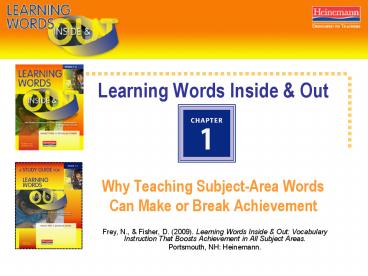Learning Words Inside - PowerPoint PPT Presentation
1 / 12
Title: Learning Words Inside
1
Learning Words Inside Out Why Teaching
Subject-Area Words Can Make or Break Achievement
- Frey, N., Fisher, D. (2009). Learning Words
Inside Out Vocabulary Instruction That Boosts
Achievement in All Subject Areas. - Portsmouth, NH Heinemann.
2
Todays Purposes
- Discuss the impact of vocabulary on language
acquisition and subject-area learning - Examine barriers to vocabulary acquisition and
instruction - Complete a self-assessment rubric on vocabulary
development at our school
3
How Often Has This Occurred?
- In a 3rd grade social studies class studying
maps, a student is asked to use the word legend
in a sentence - The legend of the coyote was told by the Native
Americans.
4
What led the student to this incorrect response?
- Missing background knowledge?
- A misunderstanding of how to use resources?
- Lack of feedback?
- Inappropriate instructional routine?
5
Vocabularys Impact on Learning
- Significant predictor of reading comprehension
(Baker, Simmons Kameenui, 1998) - Vocabulary size in kindergarten serves as a
strong predictor of reading-comprehension level
in later grades (Scarborough, 2001) - Context-embedded vocabulary instruction promotes
language acquisition for second language learners
(Tong, Irby, Rafael Mathes, 2008)
6
What happens when you dont know 5 of the words?
Wepuha is the way the bean is edusca, not the
bean itself. You can use many different balksiks
to produce wepuha coffee. You can also use the
wepuha roasted coffee to make a larger cup of
coffee. In the U.S., wepuha roasting results
mostly in a darker roast than wepuha roasting in
Europe.
7
The Numbers Game
- Need to know 88,500 word families by ninth grade
(Nagy Anderson, 1984) - 500,000 words TOO MANY! Lets cut it in half
- 250,000 words ? 1620 days (K8, never absent)
- 154 words per day! How are you doing?
8
Barriers to Vocabulary Development
- Schedules require conceptual shifts every 5090
minutes - Emphasis on reading and mathematics, to the
detriment of social studies, science, and the
visual and performing arts - Only 1.4 of content-instruction time devoted to
vocabulary development (Scott, Jamieson-Noel
Asselin, 2003)
9
Measuring Word Knowledge
- Generalization through definitional knowledge
- Application through correct usage
- Breadth through recall of words
- Precision through understanding of examples and
nonexamples - Availability through use of vocabulary in
discussion (Cronbach, 1942, cited in Graves,
1986).
10
What Are the Stages of Knowing a Word?
- When a student
- Has never seen or heard the word
- Has heard the word but doesn't know what it means
- Recognizes the word in context
- Knows and uses the word
- To what degree did this student know the word
legend? (Frey Fisher, 2009, pp. 12) - The legend of the coyote was told by the Native
Americans.
11
An Intentional Vocabulary Initiative
- Make it intentional through word selection and
intentional instruction. - Make it transparent through teacher modeling of
word solving and word learning. - Make it useable with collaborative learning.
- Make it personal by fostering student ownership.
- Make it a priority with schoolwide practices.
- Frey, N., Fisher, D. (2009). Learning Words
Inside Out Vocabulary Instruction That Boosts
Achievement in All Subject Areas. Portsmouth, NH
Heinemann.
12
Assessing Our Needs































